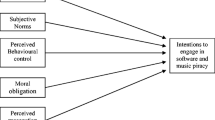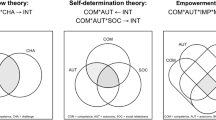Abstract
This study found evidence for a viable social cognitive model of software piracy intention using path analysis. Compared to outcome expectations, moral disengagement emerged as the stronger significant mediator in the model exerting its influence on the relationships between past behaviour and future intention and between past behaviour and outcome expectations. This study found weak evidence for the mediating influence of facilitators and impediments while their impact as a moderating variable was inconclusive.
Chapter PDF
Similar content being viewed by others
Keywords
References
Business Software Alliance, http://www.bsa.org/country.aspx?sc_lang=en-ZA
Gopal, R.D., Sanders, G.L.: International software piracy: Analysis of key issues and impacts. Info. Sys. Research 9(4), 380–397 (1998)
Eining, M.M., Christensen, A.L.: A psycho-social model of software piracy: the development and test of a model. In: Dejoie, R., Fowler, G., Paradice, D. (eds.) Ethical Issues in information systems, pp. 182–188. Boyd & Fraser, Boston (1991)
Woolley, D.J., Eining, M.M.: Software piracy among accounting students: A longitudinal comparison of changes and sensitivity. J. Info. Sys. 20(1), 49–63 (2006)
Chang, M.K.: Predicting unethical behavior: A comparison of the theory of reasoned action and the theory of planned behavior. J. Bus. Eth. 17, 1825–1834 (1998)
Peace, A.G., Galletta, D.F., Thong, J.Y.L.: Software piracy in the workplace: A model and empirical test. J. Mngt. Info. Sys. 20(1), 153–177 (2003)
Cronan, T.P., Al-Rafee, S.: Factors that influence the intention to pirate software and media. J. Bus. Eth. 78, 527–545 (2008)
Limayem, M., Khalifa, M., Chin, W.W.: Factors motivating software piracy: a longitudinal study. IEEE Trans. Eng. Mngt. 51, 414–425 (2004)
LaRose, R., Kim, J.: Share, steal or buy? A social cognitive perspective of music downloading. CyberPsych. & Beh. 10(2), 267–277 (2007)
Bandura, A.: Social foundations of thought and action: A social cognitive theory. Prentice-Hall, Englewood Cliffs (1986)
Bandura, A.: Self-efficacy: The exercise of control. W.H. Freeman and Company, New York (1997)
Bandura, A.: Health promotion by social cognitive means. Health Educ. & Beh. 31(2), 143–164 (2004)
Ajzen, I.: The theory of planned behavior. Org. Beh. & Hum. Proc. 50, 179–211 (1991)
Garbharran, A., Thatcher, A.: A case for using a social cognitive model to explain intention to pirate software. J. eHealth Tech. & App. 7(2), 87–98 (2009)
Garbharran, A., Thatcher, A. (under review): Predicting software piracy intentions in organisations: Does organisation size matter? J. Bus. Eth. (2010)
Bandura, A., Barbaranelli, C., Caprara, G.V., Pastorelli, C.: Mechanisms of moral disengagement in the exercise of moral agency. J. Pers. & Soc. Psych. 71, 364–374 (1996)
Matthews, M.S.: Bandura’s social cognitive theory in a cross-nation study of software piracy. Unpublished masters research report. University of the Witwatersrand, Johannesburg, South Africa (2009)
Wentzell, A.: The implementation of social cognitive theory in the understanding of the unauthorised copying of software. Unpublished masters research report. University of the Witwatersrand, Johannesburg, South Africa (2008)
Brown, T.A.: Confirmatory Factor Analysis for Applied Research. The Guilford Press, New York (2006)
Author information
Authors and Affiliations
Editor information
Editors and Affiliations
Rights and permissions
Copyright information
© 2011 Springer-Verlag Berlin Heidelberg
About this paper
Cite this paper
Garbharran, A., Thatcher, A. (2011). Modelling Social Cognitive Theory to Explain Software Piracy Intention. In: Smith, M.J., Salvendy, G. (eds) Human Interface and the Management of Information. Interacting with Information. Human Interface 2011. Lecture Notes in Computer Science, vol 6771. Springer, Berlin, Heidelberg. https://doi.org/10.1007/978-3-642-21793-7_34
Download citation
DOI: https://doi.org/10.1007/978-3-642-21793-7_34
Publisher Name: Springer, Berlin, Heidelberg
Print ISBN: 978-3-642-21792-0
Online ISBN: 978-3-642-21793-7
eBook Packages: Computer ScienceComputer Science (R0)




